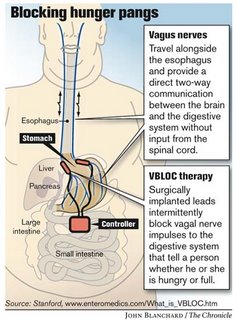Stanford in study on vagal nerve blocking, gastric bypass surgery alternative

San Francisco, CA
Stanford researchers are participating in a national study to test a new weight-loss therapy that blocks the nerves that tell people when they're hungry and control how the body stores fat.gastric bypass surgery malpractice lawyers
The treatment is considered a less invasive alternative to bariatric surgeries, which typically involve shrinking the stomach by wrapping a tight band around it or bypassing large sections of it and going straight to the rest of the digestive tract.
In the new treatment, which has been tested overseas, a device inserted just beneath the skin emits electronic impulses that confuse signals sent on the vagal nerves from the brain to the stomach. In early studies, the impulses made people feel full and satisfied when they'd otherwise be hungry.
"It starts in the brain, and works down to the stomach. We're not cutting or sewing or rerouting the anatomy here," said Dr. John Morton, a bariatric surgeon leading the study at Stanford. "It has a lot of potential to help patients lose weight."
The treatment is called VBLOC therapy, for vagal blocking. Stanford is one of 13 sites around the country participating in the study, being funded by medical device company EnteroMedics. Researchers hope to sign up 250 to 300 volunteers, about 50 of them in the Bay Area, and study them for five years.
It is a blind study - all volunteers will have the device implanted, but it will be turned on in only two-thirds of them, and neither researchers nor patients will know whether it is on or off. After the first year, the device will be turned on in all patients. More >>

0 Comments:
Post a Comment
<< Home